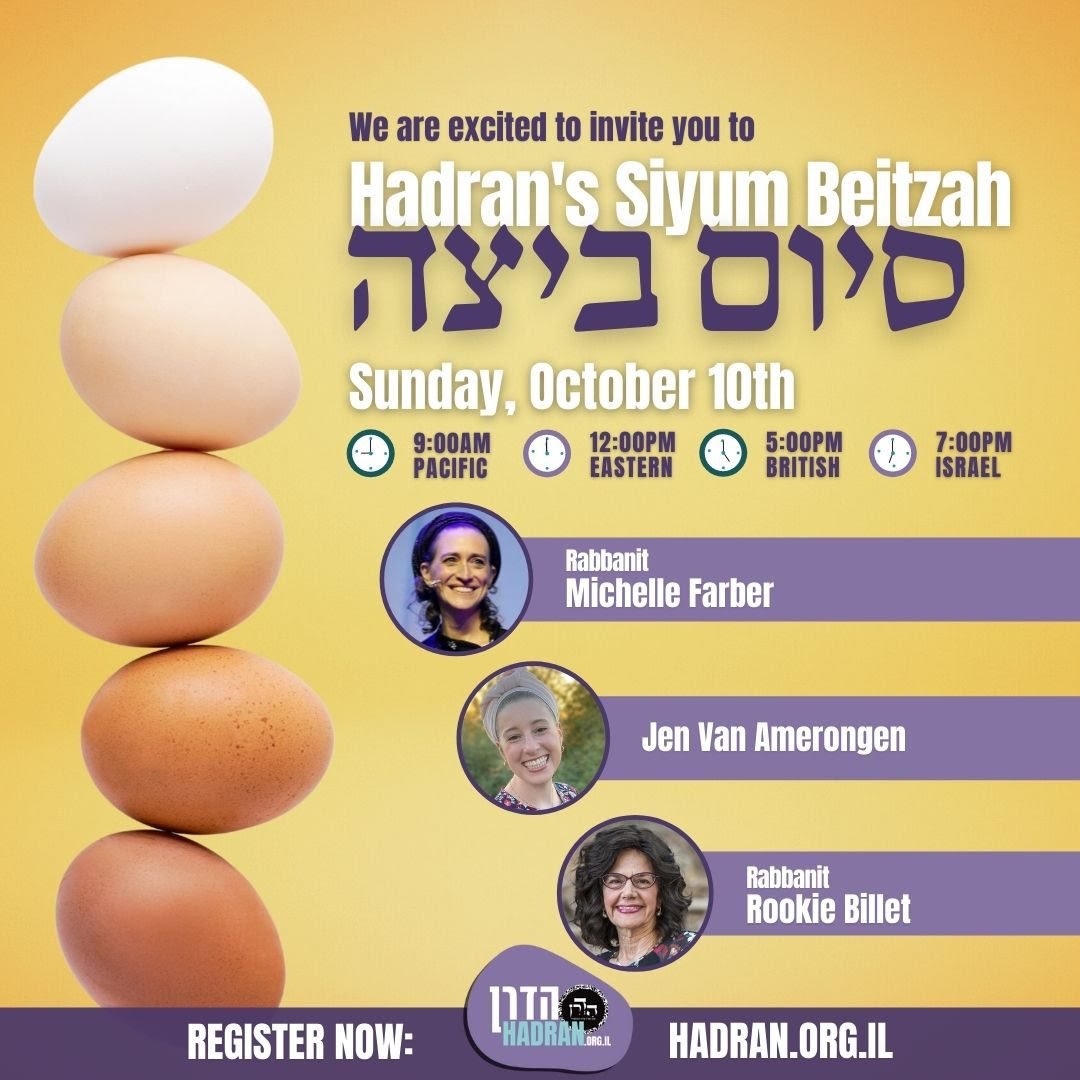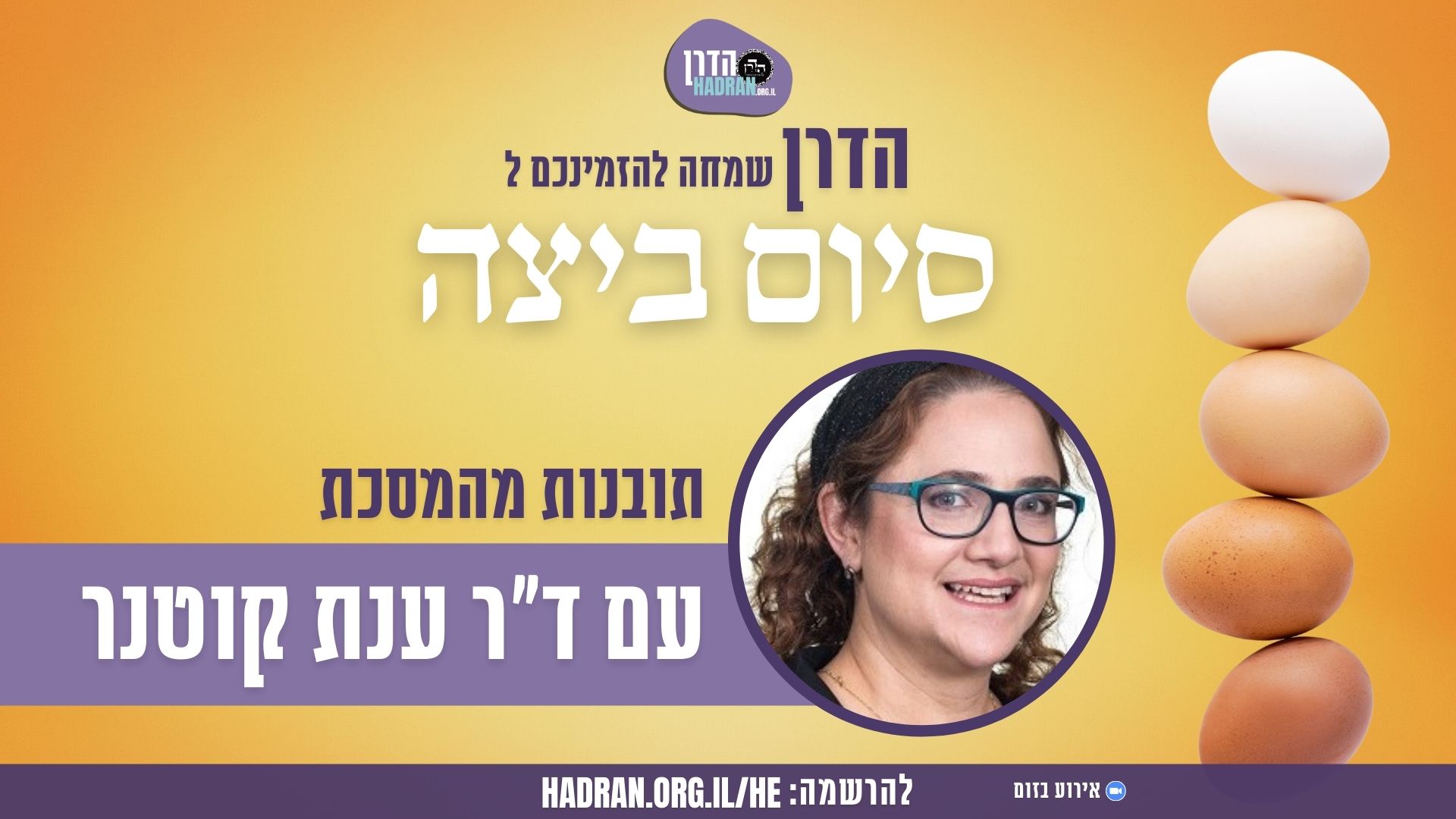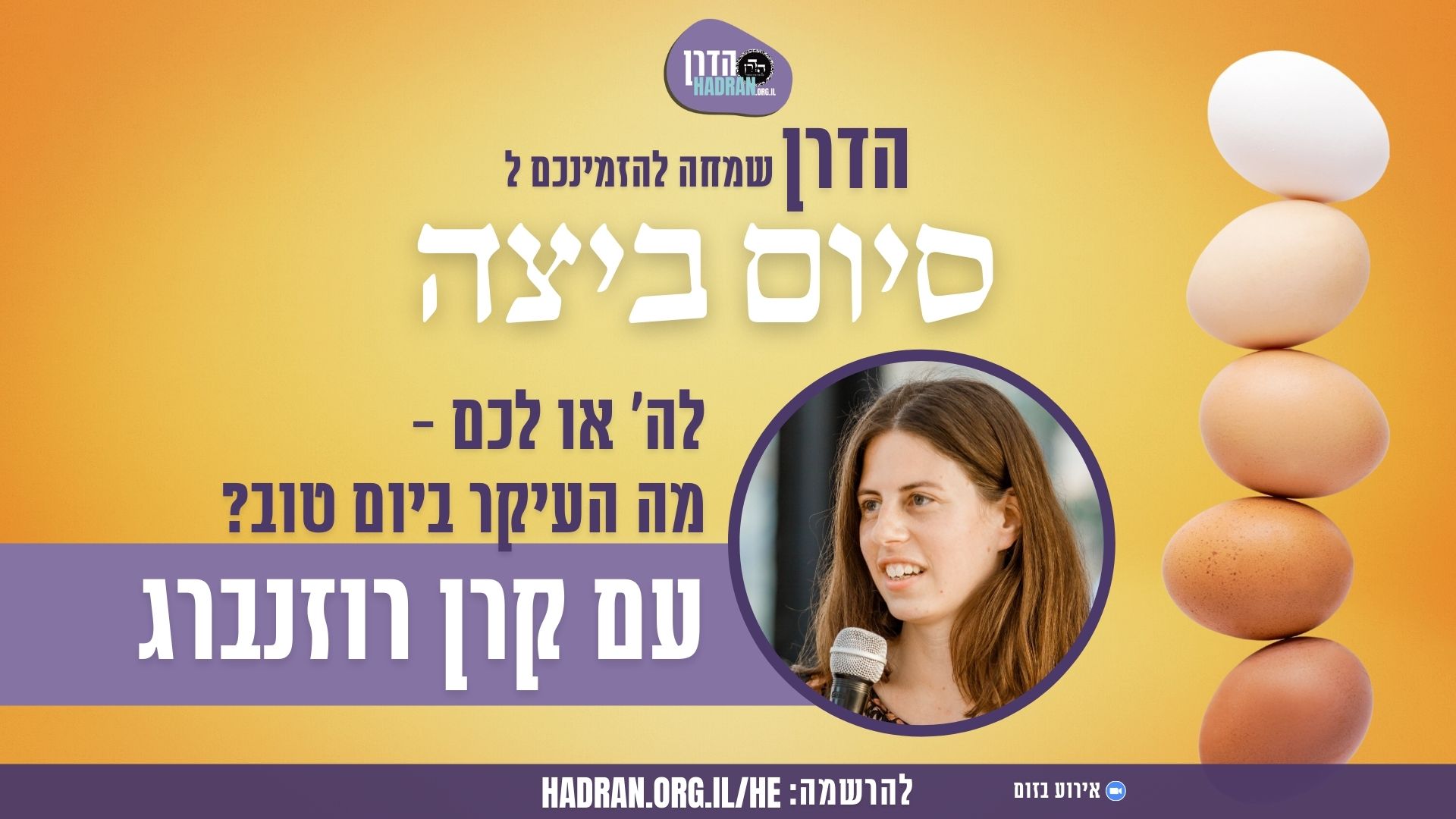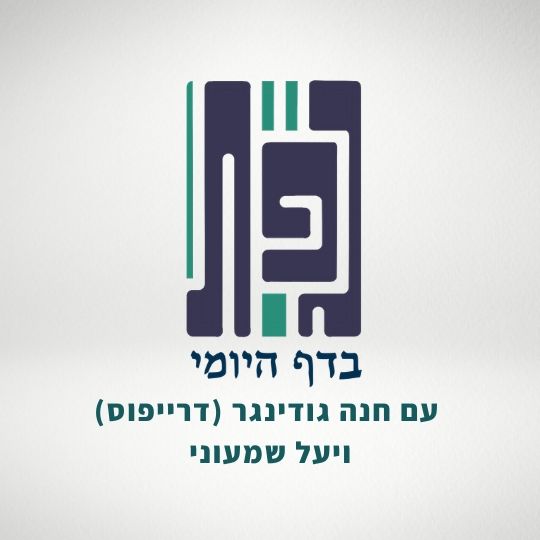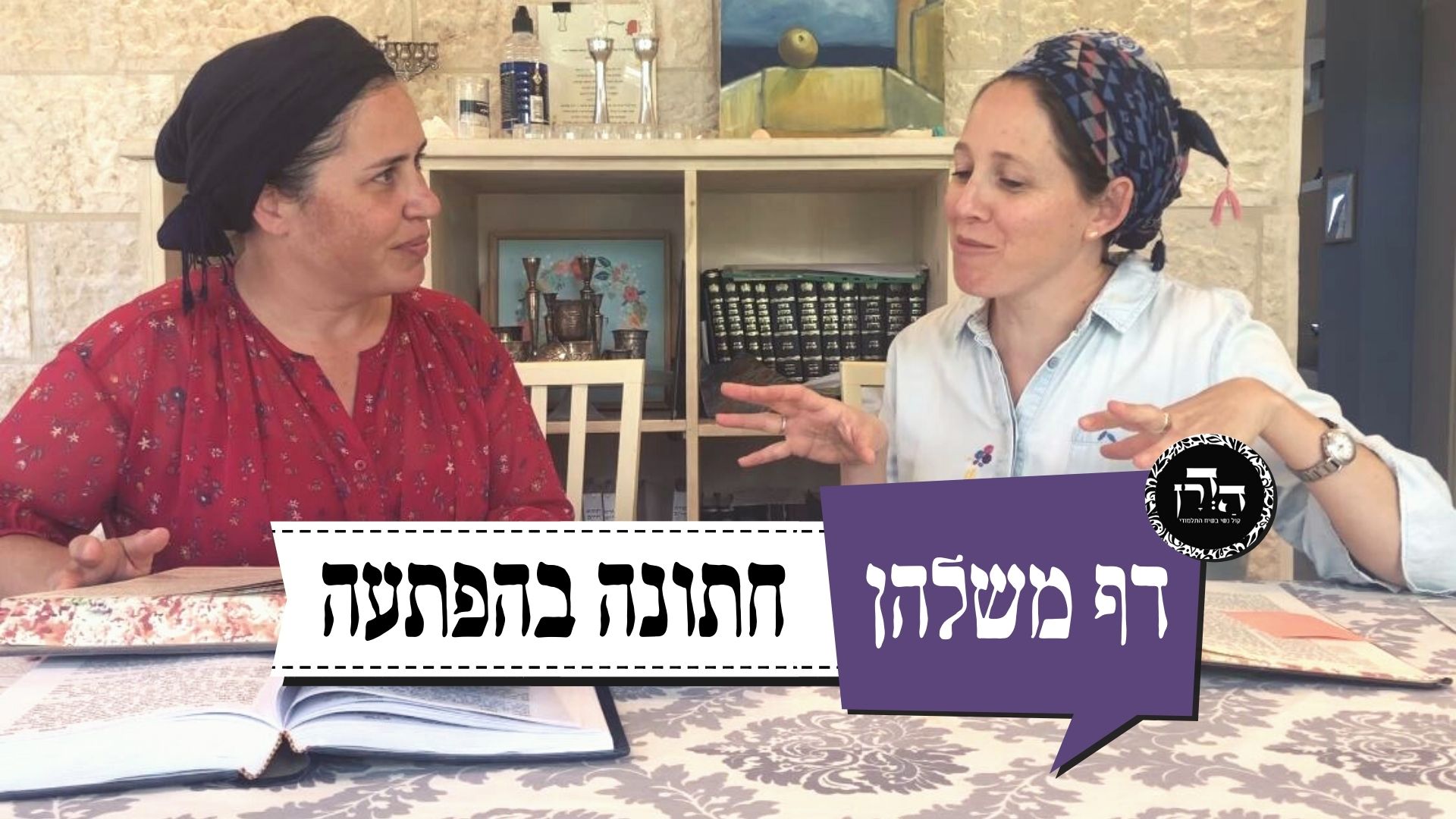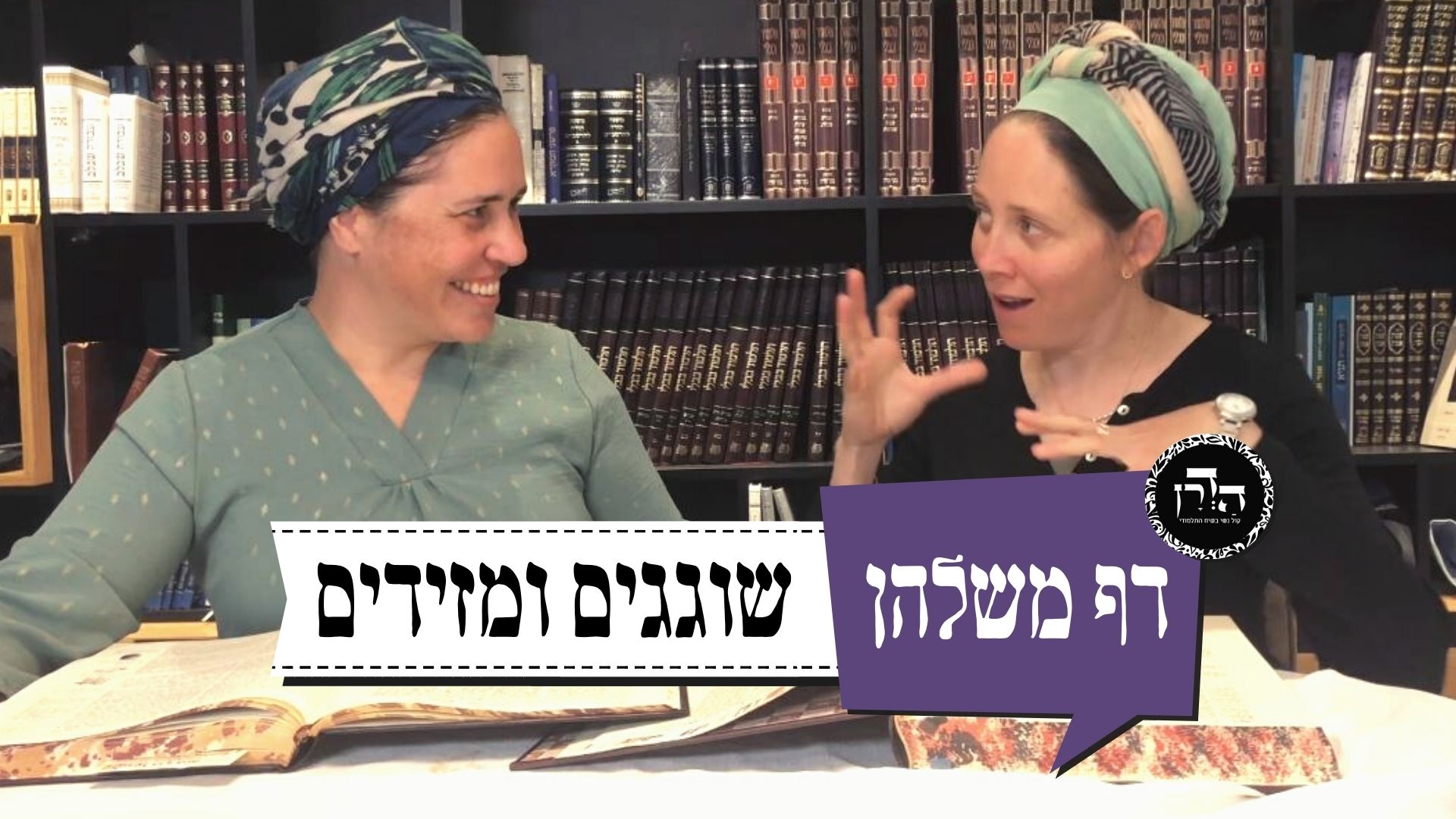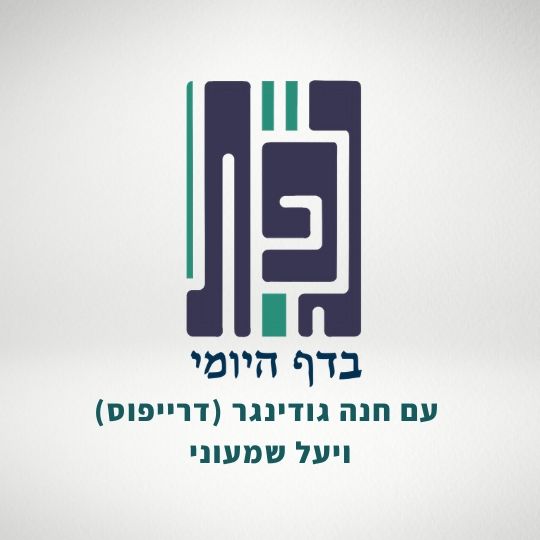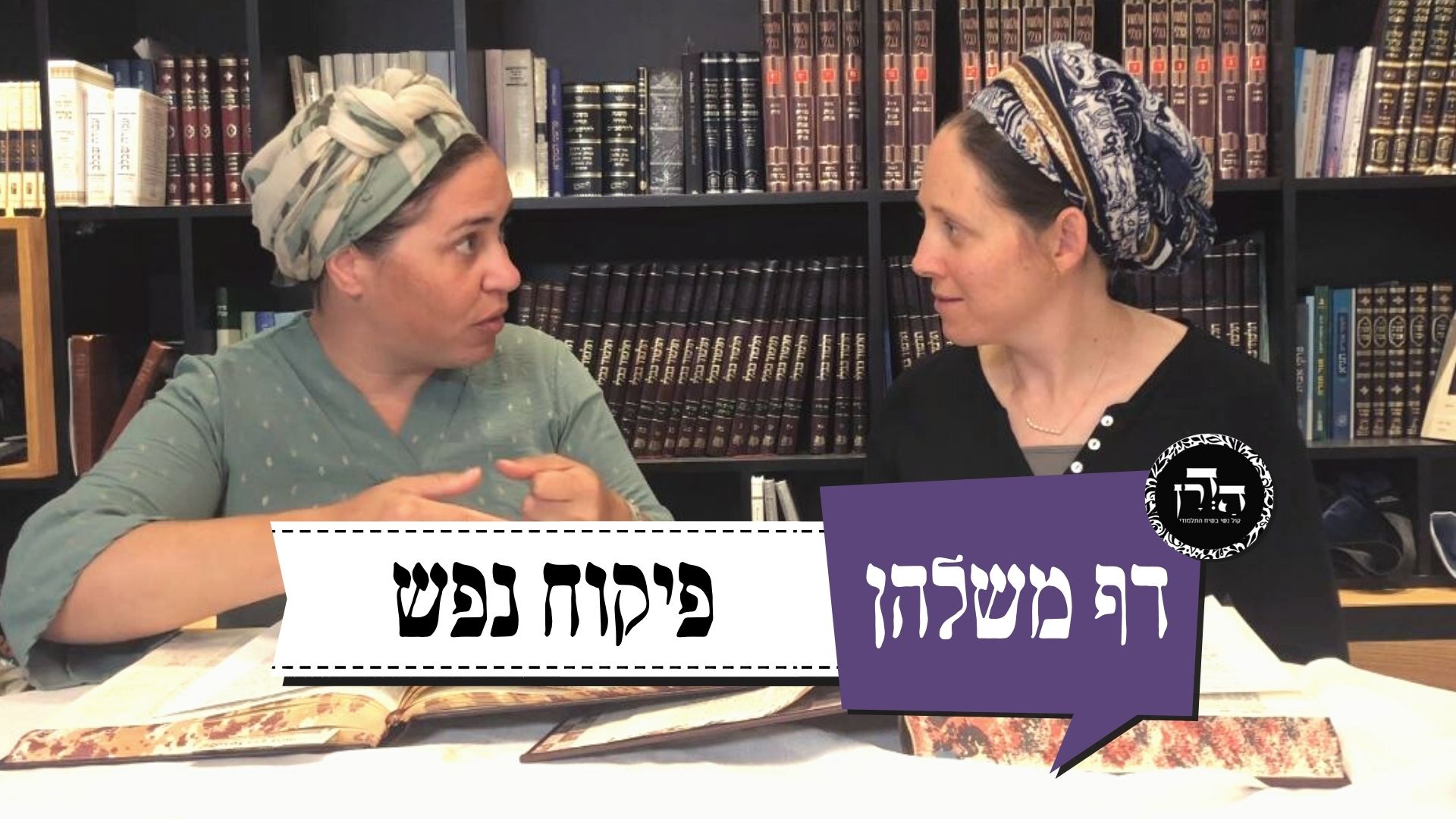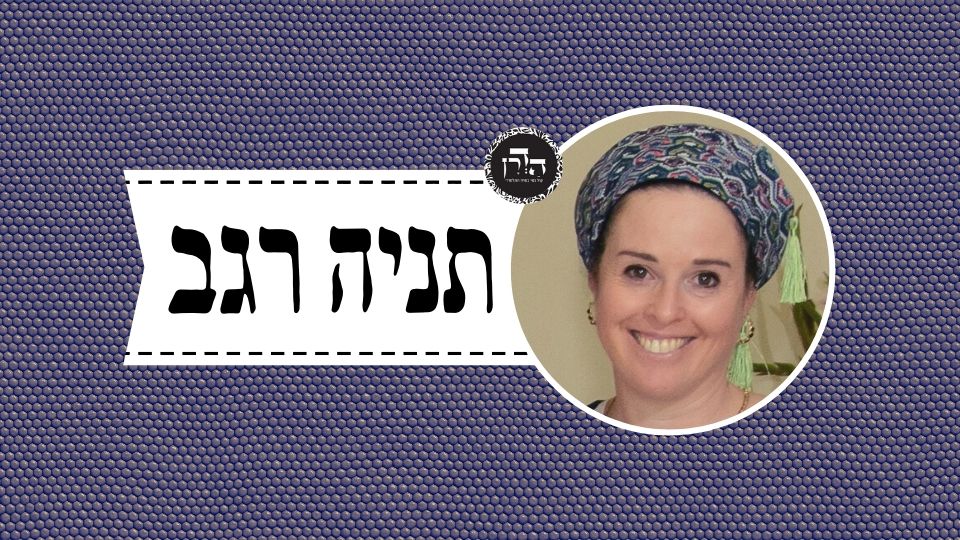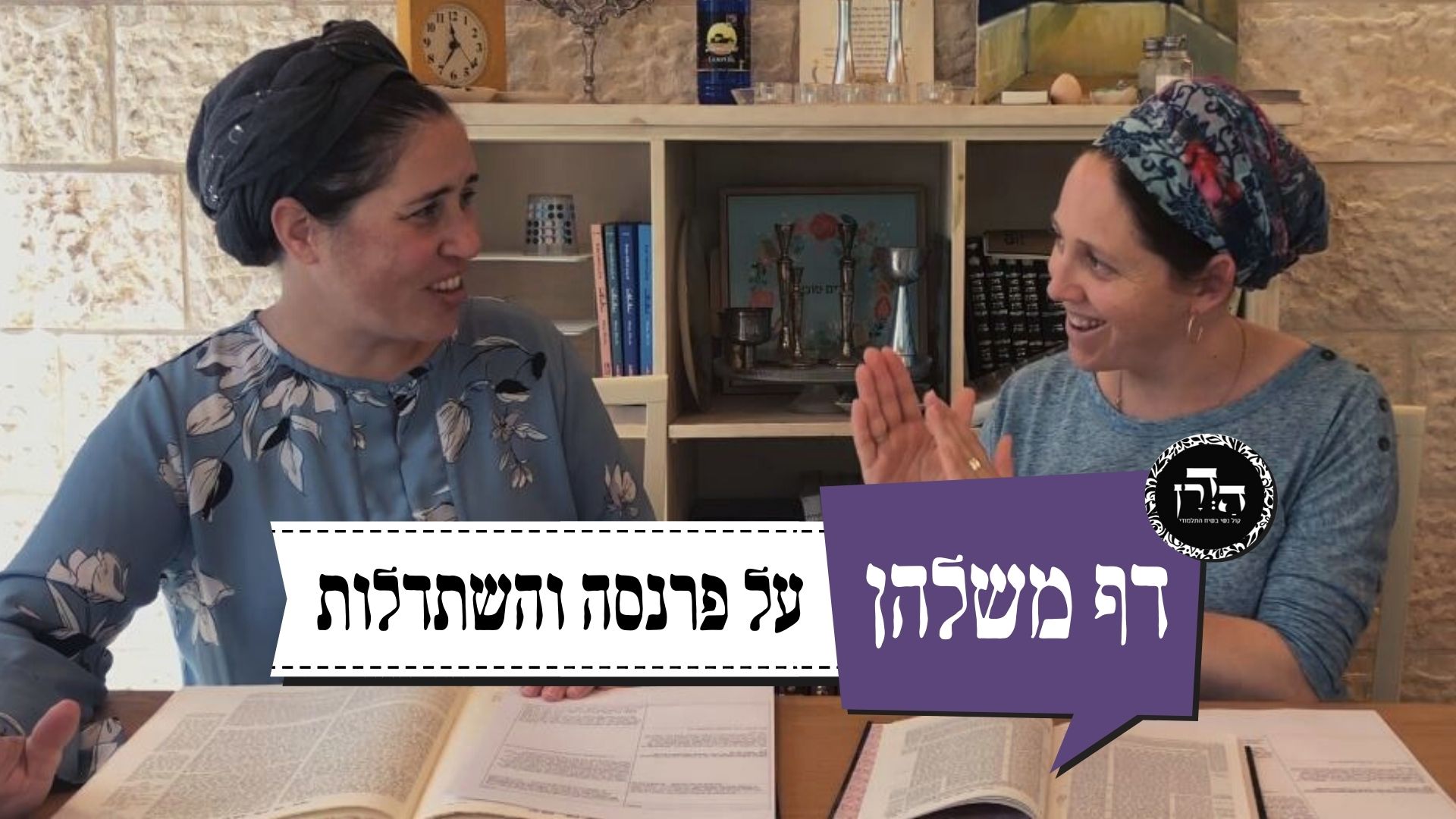ביצה כא
הוּרְצָה, עַל מְנָת לְהַקְטִיר אֵימוּרִין לָעֶרֶב. אִם זָרַק, דִּיעֲבַד — אִין, לְכַתְּחִלָּה — לָא! בִּשְׁלָמָא לְרָבָא נִיחָא, אֶלָּא לְרַבָּה בַּר רַב הוּנָא קַשְׁיָא! קַשְׁיָא. וְאִיבָּעֵית אֵימָא: שָׁאנֵי שְׁבוּת שַׁבָּת מִשְּׁבוּת יוֹם טוֹב.
the offering is accepted on condition that he burn the sacrificial parts that are brought upon the altar in the evening and not during the day. The wording of the baraita indicates that if the meat may not be eaten on that day, then only if he already sprinkled the blood, i.e., after the fact, yes, it is permitted; however, he may not sprinkle it ab initio. Granted, according to the opinion of Rava it works out well, but according to the opinion of Rabba bar Rav Huna, it is difficult. The Gemara comments: Indeed, it is difficult. And if you wish, say instead: A rabbinic decree concerning Shabbat is different from a rabbinic decree concerning a Festival, as the Sages were more stringent with regard to Shabbat than with regard to Festivals.
בְּעָא מִנֵּיהּ רַב אַוְיָא סָבָא מֵרַב הוּנָא: בְּהֵמָה חֶצְיָהּ שֶׁל גּוֹי וְחֶצְיָהּ שֶׁל יִשְׂרָאֵל, מַהוּ לְשׇׁחְטָהּ בְּיוֹם טוֹב? אָמַר לֵיהּ: מוּתָּר. אֲמַר לֵיהּ: וְכִי מָה בֵּין זֶה לִנְדָרִים וּנְדָבוֹת? אֲמַר לֵיהּ: עוֹרְבָא פָּרַח!
§ Rav Avya the Elder raised the following dilemma before Rav Huna: If an animal is owned in partnership, half of it belonging to a gentile and half of it to a Jew, what is the halakha with regard to slaughtering it on a Festival? Rav Huna said to him: It is permitted. Rav Avya said to him: And what is the difference between this case and that of vow-offerings and gift-offerings? Vow-offerings and gift-offerings are similar to jointly owned animals, as part of the animal is sacrificed upon the altar while the other part is eaten by the owner and the priest. Why, then, is it not similarly permitted to slaughter them on a Festival? Seeking to distract Rav Avya so that he need not answer his question, Rav Huna said to him: Look, a raven flies in the sky.
כִּי נְפַק אֲמַר לֵיהּ רַבָּה בְּרֵיהּ: לָאו הַיְינוּ רַב אַוְיָא סָבָא דְּמִשְׁתַּבַּח לֵיהּ מָר בְּגַוֵּיהּ דְּגַבְרָא רַבָּה הוּא? אֲמַר לֵיהּ: וּמָה אֶעֱבֵיד לֵיהּ, אֲנִי הַיּוֹם ״סַמְּכוּנִי בָּאֲשִׁישׁוֹת רַפְּדוּנִי בַּתַּפּוּחִים״, וּבְעָא מִינַּאי מִלְּתָא דְּבָעֲיָא טַעְמָא.
When Rav Avya left, Rabba, son of Rav Huna, said to his father: Was this not Rav Avya the Elder, whom Master would recommend to us, saying that he is a great man? If so, why did you treat him in that manner and evade his question? Rav Huna said to him: What should I have done for him? Today I am in a state best described by the verse: “Let me lean against the stout trunks; let me couch among the apple trees” (Song of Songs 2:5), meaning I am worn out and exhausted from all the communal responsibility that has fallen upon me, and he asked me about something that requires reasoning and careful examination, and therefore I could not provide an immediate answer.
וְטַעְמָא מַאי? בְּהֵמָה חֶצְיָהּ שֶׁל גּוֹי וְחֶצְיָהּ שֶׁל יִשְׂרָאֵל מוּתָּר לְשׇׁחְטָהּ בְּיוֹם טוֹב, דְּאִי אֶפְשָׁר לִכְזַיִת בָּשָׂר בְּלֹא שְׁחִיטָה. אֲבָל נְדָרִים וּנְדָבוֹת אָסוּר לְשׇׁחְטָן בְּיוֹם טוֹב, דְּכֹהֲנִים כִּי קָא זָכוּ — מִשֻּׁלְחַן גָּבוֹהַּ קָא זָכוּ.
The Gemara asks: And what, then, is the reason? The Gemara explains the difference between a jointly owned animal and a vow-offering or gift-offering: A jointly owned animal, half of which belongs to a gentile and half to a Jew, may be slaughtered on a Festival, as it is impossible to obtain an olive-bulk of meat without slaughtering. If a Jew wishes to eat even a small portion of meat, he has no alternative but to slaughter an entire animal, even though he will not use all of it. Therefore, it does not matter if part of the animal belongs to a gentile. However, it is prohibited to slaughter vow-offerings and gift-offerings on a Festival, because in this case there is no real joint ownership of the animal, as the priests, when they receive their portions of the meat of the offering, and similarly, when Israelites partake of the offering, they receive their portions from the table of the Most High. In other words, the entire offering belongs to God, and those who partake of it are considered guests at His table; and as stated above, one may not slaughter an animal on a Festival for the sake of God.
אָמַר רַב חִסְדָּא בְּהֵמָה חֶצְיָהּ שֶׁל גּוֹי וְחֶצְיָהּ שֶׁל יִשְׂרָאֵל — מוּתָּר לְשׇׁחְטָהּ בְּיוֹם טוֹב, דְּאִי אֶפְשָׁר לִכְזַיִת בָּשָׂר בְּלֹא שְׁחִיטָה. עִיסָּה חֶצְיָהּ שֶׁל גּוֹי וְחֶצְיָהּ שֶׁל יִשְׂרָאֵל — אָסוּר לֶאֱפוֹתָהּ בְּיוֹם טוֹב, דְּהָא אֶפְשָׁר לֵיהּ לְמִפְלְגַהּ בְּלֵישָׁה.
In continuation of the previous discussion, Rav Ḥisda said: A jointly owned animal, half of which belongs to a gentile and half to a Jew, may be slaughtered on a Festival because it is impossible to obtain an olive-bulk of meat without slaughtering. However, with regard to dough, half of which belongs to a gentile and half to a Jew, it is prohibited to bake it on a Festival, as it is possible for him to divide it in half during the kneading and bake only the part that belongs to the Jew.
מֵתִיב רַב חָנָא בַּר חֲנִילַאי: עִיסַּת כְּלָבִים בִּזְמַן שֶׁהָרוֹעִין אוֹכְלִין מִמֶּנָּה — חַיֶּיבֶת בְּחַלָּה, וּמְעָרְבִין בָּהּ, וּמִשְׁתַּתְּפִין בָּהּ, וּמְבָרְכִין עָלֶיהָ, וּמְזַמְּנִין עָלֶיהָ, וְנֶאֱפֵת בְּיוֹם טוֹב, וְאָדָם יוֹצֵא בָּהּ יְדֵי חוֹבָתוֹ בַּפֶּסַח.
Rav Ḥana bar Ḥanilai raised an objection from the following mishna: Dough for bread that is meant for dogs, when it is of such quality that even shepherds eat of it, is considered like regular bread. Accordingly, one is obligated to separate ḥalla from such dough, and one may use it to establish an eiruv, i.e., a joining of courtyards and a joining of Shabbat boundaries, and to establish a merging of alleyways, and one recites a blessing before and after eating it, and one invites those with whom he ate to recite Grace after Meals after eating it, and it may be baked on a Festival, like all foods fit for human consumption, and a person fulfills his obligation to eat matza on the first night of Passover with it if it has not leavened.
וְאַמַּאי? וְהָא אֶפְשָׁר לֵיהּ לְמִפְלְגַהּ בְּלֵישָׁה! שָׁאנֵי עִיסַּת כְּלָבִים, הוֹאִיל וְאֶפְשָׁר לְפַיְּיסָן בִּנְבֵלָה.
With regard to the allowance to bake this dough, the Gemara asks: And why may it be baked on a Festival? Isn’t it possible to divide it during the kneading, so that he bakes only the portion to be eaten by people and leaves aside the part given to dogs? The Gemara answers: Dough for bread meant for dogs is different, since it is possible to appease them with a carcass. It is possible that one of his animals will die, and he will feed the carcass to the dogs, in which case all of the dough will be eaten by people.
וּמִי אִית לֵיהּ לְרַב חִסְדָּא ״הוֹאִיל״? וְהָא אִתְּמַר: הָאוֹפֶה מִיּוֹם טוֹב לְחוֹל, רַב חִסְדָּא אָמַר: לוֹקֶה, רַבָּה אָמַר: אֵינוֹ לוֹקֶה.
The Gemara challenges this explanation: Does Rav Ḥisda accept the principle of since, i.e., that since it is possible that the situation may change, the halakha is not determined based on the current circumstances? But wasn’t it stated that the amora’im disagreed about the halakha governing one who intentionally bakes on a Festival day for a weekday? Rav Ḥisda said: He is flogged for desecrating the Festival. Rabba said: He is not flogged.
רַב חִסְדָּא אָמַר: לוֹקֶה, לָא אָמְרִינַן ״הוֹאִיל וּמִקַּלְעִי לֵיהּ אוֹרְחִים חֲזֵי לֵיהּ — הַשְׁתָּא נָמֵי חֲזֵי לֵיהּ״. רַבָּה אָמַר: אֵינוֹ לוֹקֶה, אָמְרִינַן ״הוֹאִיל״.
The Gemara explains the two opinions: Rav Ḥisda said that he is flogged because he holds that we do not say that since, if guests happen to visit him, whatever he bakes will be fit for him on the Festival itself, now too, although guests have not yet arrived, it is considered fit for him. According to that logic, baking would not be considered a full-fledged transgression, and one cannot be forewarned about it and does not receive lashes. Rabba, however, said: He is not flogged, as he holds that we do say the principle of: Since. As Rav Ḥisda himself does not accept the principle of since, how can it be used to resolve a difficulty raised against him?
אֶלָּא: לָא תֵּימָא ״הוֹאִיל וְאֶפְשָׁר״, אֶלָּא כְּגוֹן דְּאִית לֵיהּ נְבֵלָה, דְּוַדַּאי אֶפְשָׁר לְפַיְּיסַן בִּנְבֵלָה.
Rather, the Gemara retracts its previous answer: Do not say that dough for dogs is different, since it is possible that one of his animals will die and he will appease the dogs with the carcass. Rather, the reference here is to a case where he has a carcass ready, so that it is certainly possible to appease them with the carcass. Consequently, when the shepherds bake the dough, it is highly likely that they will consume it all themselves.
בְּעוֹ מִנֵּיהּ מֵרַב הוּנָא: הָנֵי בְּנֵי בָּאגָא דִּרְמוֹ עֲלַיְיהוּ קִמְחָא דִּבְנֵי חֵילָא מַהוּ לֶאֱפוֹתָהּ בְּיוֹם טוֹב? אֲמַר (לֵיהּ): חֲזֵינָא אִי יָהֲבִי לֵיהּ רִפְתָּא לְיָנוֹקָא וְלָא קָפְדִי, כׇּל חֲדָא וַחֲדָא חַזְיָא לְיָנוֹקָא, וּשְׁרֵי. וְאִי לָאו — אָסוּר.
§ They raised a dilemma before Rav Huna: With regard to the Jewish residents of a village [baga] upon whom the authorities imposed the obligation to supply flour and bread to the gentile military troops serving in the area, what is the halakha with regard to baking it on a Festival? Rav Huna said to them: We examine the matter: If those villagers can give bread from the soldiers’ quota to a child and the soldiers are not particular about it, then each and every one of the loaves is fit for a Jewish child, and therefore it is permitted to bake them. But if the soldiers do not allow anyone else to partake of their bread, it is prohibited to bake the loaves for them on a Festival.
וְהָתַנְיָא: מַעֲשֶׂה בְּשִׁמְעוֹן הַתִּימְנִי שֶׁלֹּא בָּא אֶמֶשׁ לְבֵית הַמִּדְרָשׁ. בְּשַׁחֲרִית מְצָאוֹ [רַבִּי] יְהוּדָה בֶּן בָּבָא, אָמַר לוֹ: מִפְּנֵי מָה לֹא בָּאתָ אֶמֶשׁ לְבֵית הַמִּדְרָשׁ? אָמַר לוֹ: בַּלֶּשֶׁת בָּאָה לְעִירֵנוּ, וּבִקְּשָׁה לַחְטוֹף אֶת כָּל הָעִיר, וְשָׁחַטְנוּ לָהֶם עֵגֶל וְהֶאֱכַלְנוּם, וּפְטַרְנוּם לְשָׁלוֹם.
The Gemara challenges Rav Huna’s lenient ruling: But isn’t it taught in a baraita: There was an incident involving Shimon the Timnite, who did not come on the night of the Festival to the study hall. In the morning, Rabbi Yehuda ben Bava found him and said to him: Why did you not come last night to the study hall? He said to him: A military unit on a search mission [balleshet] came to our city and wanted to pillage the entire city. We slaughtered a calf in order to placate them, and we fed them with it and had them depart in peace.
אָמַר לוֹ: תָּמֵהַּ אֲנִי אִם לֹא יָצָא שְׂכַרְכֶם בְּהֶפְסֵדְכֶם, שֶׁהֲרֵי אָמְרָה תּוֹרָה: ״לָכֶם״ — וְלֹא לְגוֹיִם. וְאַמַּאי? הָא חֲזֵי לְמֵיכַל מִינֵּיהּ!
Rav Yehuda ben Bava said to him: I wonder if your gain, that which you saved by preventing the soldiers from taking your possessions, was not outweighed by your loss, the punishment for your desecration of the Festival. As the Torah states: “Only that which every soul must eat, that alone may be done for you” (Exodus 12:16), which indicates that food may be prepared for you, but not for gentiles. The Gemara asks: But why did Rabbi Yehuda ben Bava say this? Wasn’t some portion of the calf fit to be eaten by them? The conclusion seems to be that even if a Jew may eat from an animal, it may not be slaughtered on a Festival for the sake of a gentile.
אָמַר רַב יוֹסֵף: עֵגֶל טְרֵפָה הֲוַאי. וְהָא חֲזֵי לִכְלָבִים!
Rav Yosef said: In that case it was a calf with a condition that would cause it to die within twelve months [tereifa], which may not be eaten by Jews. The Gemara challenges: But wasn’t it still fit to be eaten by dogs, and it could be argued that it was slaughtered for the sake of dogs belonging to Jews?
תַּנָּאֵי הִיא. דְּתַנְיָא: ״אַךְ אֲשֶׁר יֵאָכֵל לְכׇל נֶפֶשׁ הוּא לְבַדּוֹ יֵעָשֶׂה לָכֶם״, מִמַּשְׁמַע שֶׁנֶּאֱמַר ״לְכׇל נֶפֶשׁ״, שׁוֹמֵעַ אֲנִי אֲפִילּוּ נֶפֶשׁ בְּהֵמָה בַּמַּשְׁמָע, כְּעִנְיָן שֶׁנֶּאֱמַר: ״וּמַכֵּה נֶפֶשׁ בְּהֵמָה יְשַׁלְּמֶנָּה״, תַּלְמוּד לוֹמַר ״לָכֶם״.
The Gemara answers: The question of whether or not one may perform prohibited labor on a Festival for the sake of dogs is a dispute between tanna’im. As it is taught in a baraita: It is written: “Only that which every soul must eat, that alone may be done for you.” By inference, from that which is stated: “Every soul,” I might derive that even the soul of an animal is included, similar to that which is stated: “And he that kills the soul of an animal shall pay it” (Leviticus 24:18), indicating that the life force of an animal is also called a soul. Therefore, the verse states and emphasizes: “For you,”
״לָכֶם״ — וְלֹא לִכְלָבִים, דִּבְרֵי רַבִּי יוֹסֵי הַגְּלִילִי. רַבִּי עֲקִיבָא אוֹמֵר: אֲפִילּוּ נֶפֶשׁ בְּהֵמָה בַּמַּשְׁמָע. אִם כֵּן, מָה תַּלְמוּד לוֹמַר ״לָכֶם״ — לָכֶם וְלֹא לְגוֹיִם.
indicating for you, but not for dogs; this is the statement of Rabbi Yosei HaGelili. Rabbi Akiva says: When the verse states “every soul,” it comes to teach that even the soul of an animal is included. If so, what is the meaning when the verse states “for you”? It means for you, but not for gentiles.
וּמָה רָאִיתָ לְרַבּוֹת אֶת הַכְּלָבִים וּלְהוֹצִיא אֶת הַגּוֹיִם? מְרַבֶּה אֲנִי אֶת הַכְּלָבִים — שֶׁמְּזוֹנוֹתָן עָלֶיךָ, וּמוֹצִיא אֲנִי אֶת הַגּוֹיִם — שֶׁאֵין מְזוֹנוֹתָן עָלֶיךָ.
The Gemara asks: And what did you see that led you to include dogs among those on whose behalf one is permitted to perform a labor on a Festival, and to exclude gentiles? The Gemara explains: I include dogs because the responsibility for their sustenance is incumbent upon you, as one is obligated to feed the animals in his possession; and I exclude gentiles because the responsibility for their sustenance is not incumbent upon you.
אֲמַר לֵיהּ אַבָּיֵי לְרַב יוֹסֵף: וּלְרַבִּי יוֹסֵי הַגְּלִילִי, דְּאָמַר ״לָכֶם״ וְלֹא לִכְלָבִים, הָנֵי סוּפְלֵי לְחֵיוָתָא הֵיכִי שָׁדֵינַן לְהוּ בְּיוֹם טוֹב?
With regard to this baraita, Abaye said to Rav Yosef: And according to Rabbi Yosei HaGelili, who said that the verse indicates: “For you,” but not for dogs, how are we permitted to cast date stones to animals on a Festival? Since date stones are not fit for human consumption, they should be considered muktze, and therefore it should be prohibited to handle them.
אֲמַר לֵיהּ: הוֹאִיל וַחֲזוּ לְהַסָּקָה. תִּינַח בְּיַבִּישְׁתָּא, בְּרַטִּיבְתָּא מַאי אִיכָּא לְמֵימַר? אֲמַר לֵיהּ: חֲזוּ לְהֶיסֵּק גָּדוֹל.
Rav Yosef said to him: Since they are fit for fuel, they may be handled, and therefore they may also be given to animals. Abaye objected: This works out well in the case of dry date stones; but in the case of moist ones, which are not suited for fuel, what is there to say? He said to him: They are fit for a large fire, which dries them out, after which they burn well.
תִּינַח בְּיוֹם טוֹב, בְּשַׁבָּת מַאי אִיכָּא לְמֵימַר? מְטַלְטְלִינַן לְהוּ אַגַּב רִיפְתָּא. כְּדִשְׁמוּאֵל, דְּאָמַר שְׁמוּאֵל: עוֹשֶׂה אָדָם כׇּל צָרְכּוֹ בְּפַת.
Abaye raised another objection: This works out well in the case of a Festival, when it is permitted to fuel a fire, but in the case of Shabbat, what is there to say? Why should one be permitted to handle date stones on Shabbat? Rav Yosef answered: We carry them along with bread. We place the date stones upon a loaf of bread and move them together with it. This is in accordance with the opinion of Shmuel, as Shmuel said: A person may perform all his needs with bread; as long as the bread remains edible, he need not be concerned that he is treating the bread contemptuously.
וּפְלִיגָא דְּרַבִּי יְהוֹשֻׁעַ בֶּן לֵוִי, דְּאָמַר רַבִּי יְהוֹשֻׁעַ בֶּן לֵוִי: מְזַמְּנִין אֶת הַגּוֹי בְּשַׁבָּת, וְאֵין מְזַמְּנִין אֶת הַגּוֹי בְּיוֹם טוֹב, גְּזֵרָה שֶׁמָּא יַרְבֶּה בִּשְׁבִילוֹ.
The Gemara comments: And the ruling of Rav Huna that one is permitted to bake for gentiles on a Festival if they allow a Jew to eat of the bread differs from the opinion of Rabbi Yehoshua ben Levi. As Rabbi Yehoshua ben Levi said: One may invite a gentile for a meal on Shabbat, as he will certainly not cook for him on Shabbat, and it is permitted to give a gentile food that was prepared the day before. But one may not invite a gentile for a meal on a Festival; this is prohibited as a preventive measure lest he come to cook more for the gentile’s sake. This indicates that Rabbi Yehoshua ben Levi holds that one may not prepare more for a gentile, even if the meal is primarily meant for Jews.
רַב אַחָא בַּר יַעֲקֹב אָמַר: אֲפִילּוּ בְּשַׁבָּת נָמֵי לָא, מִשּׁוּם שִׁיּוּרֵי כוֹסוֹת. אִי הָכִי, דִּידַן נָמֵי! דִּידַן חֲזוּ לְתַרְנְגוֹלִין. דִּידְהוּ נָמֵי חֲזוּ לְתַרְנְגוֹלִין! דִּידְהוּ — אִיסּוּרֵי הֲנָאָה נִינְהוּ.
Rav Aḥa bar Ya’akov said: Even on Shabbat as well, one may not invite a gentile for a meal due to the wine remnants in the cups. Once a gentile has drunk wine from a cup, whatever remains in the cup may not be used and is therefore considered muktze. Therefore, a Jew may not host a gentile on Shabbat lest he come to handle the muktze wine remnants on Shabbat. The Gemara asks: If so, our cups should also be prohibited, as they too contain wine remnants that have no use whatsoever and should therefore be considered muktze. The Gemara answers: The remnants in our cups are fit for chickens. The Gemara objects: If so, the remnants in their cups are also fit for chickens. The Gemara rejects this argument: The remnants in their cups are items from which it is prohibited to derive any benefit whatsoever; consequently, they may not be handled at all.
וּלְטַלְטְלִינְהוּ אַגַּב כָּסָא? מִי לָא אָמַר רָבָא: מְטַלְטְלִין כָּנוּנָא אַגַּב קִטְמֵיהּ, אַף עַל גַּב דְּאִיכָּא עֲלֵיהּ שִׁבְרֵי עֵצִים!
The Gemara asks: And let him move what remains of the wine on account of the cup, which is a vessel that may be handled, as the wine remnants should be considered nullified in relation to the cup. Didn’t Rava say: One may move a coal pan [kannuna] on account of the ashes that can be used to cover filth, even though there are broken pieces of wood on it that have no use? This indicates that one may move something that is muktze along with something else that one is permitted to handle.
הָתָם — לָאו אִיסּוּרֵי הֲנָאָה נִינְהוּ, הָכָא — אִיסּוּרֵי הֲנָאָה נִינְהוּ.
The Gemara rejects this argument: There is a difference between the two cases. There, the broken sticks are not items from which it is prohibited to derive any benefit but are merely muktze, whereas here, what remains of the wine in the gentile’s cup is an item from which it is prohibited to derive any benefit, and therefore the prohibition is more stringent.
אֲמַר לֵיהּ רַב אַחָא מִדִּפְתִּי לְרָבִינָא: וְלֶהֱוֵי כִּגְרָף שֶׁל רְעִי! אֲמַר לֵיהּ: וְכִי עוֹשִׂין גְּרָף שֶׁל רְעִי לְכַתְּחִלָּה?
Rav Aḥa of Difti said to Ravina: But let it be like a chamber pot for feces, which may be removed from a room because it is repulsive. One should likewise be permitted to discard the remnants of these cups, since it is unseemly to leave them on the table. Ravina said to him: If the cups contain such remnants, they may be removed, but may one make a chamber pot for feces ab initio? The Sages ruled that one may not invite a gentile for a meal on Shabbat so as to avoid such complications.
אַדְבְּרֵיהּ רָבָא לְמָר שְׁמוּאֵל, וּדְרַשׁ: מְזַמְּנִין אֶת הַגּוֹי בְּשַׁבָּת, וְאֵין מְזַמְּנִין אֶת הַגּוֹי בְּיוֹם טוֹב, גְּזֵרָה שֶׁמָּא יַרְבֶּה בִּשְׁבִילוֹ. מָרִימָר וּמַר זוּטְרָא, כִּי הֲוָה מִקְּלַע לְהוּ גּוֹי בְּיוֹם טוֹב, אָמְרִי לֵיהּ: אִי נִיחָא לָךְ בְּמַאי דִּטְרִיחָא לַן מוּטָב, וְאִי לָא — טִרְחָא יַתִּירָא אַדַּעְתָּא דִּידָךְ לָא טָרְחִינַן.
In summary of this halakha, the Gemara states that Rava authorized the Sage Mar Shmuel, from the house of the Exilarch, to deliver a public lecture, and the latter taught: One may invite a gentile for a meal on Shabbat, but one may not invite a gentile for a meal on a Festival as a preventive measure, lest he come to cook more for his sake. It is related about Mareimar and Mar Zutra that when a gentile would happen to come to their house on a Festival, they would say to him: If you are satisfied with the food that we have prepared for ourselves, good; and if not, we will not go to any extra trouble on your account.
מַתְנִי׳ בֵּית שַׁמַּאי אוֹמְרִים: לֹא יָחֵם אָדָם חַמִּין לְרַגְלָיו אֶלָּא אִם כֵּן רְאוּיִין לִשְׁתִיָּה. וּבֵית הִלֵּל מַתִּירִין. עוֹשֶׂה אָדָם מְדוּרָה וּמִתְחַמֵּם כְּנֶגְדָּהּ.
MISHNA: Beit Shammai say: A person may not heat water on a Festival in order to wash his feet unless it is also fit for drinking, as they hold that kindling a fire on a Festival is permitted only for the sake of preparing food, but not for washing. But Beit Hillel permit one to kindle a fire on a Festival even for washing. A person may kindle a large fire and warm himself at it.
גְּמָ׳ אִיבַּעְיָא לְהוּ: הַאי מְדוּרָה מַאן קָתָנֵי לַהּ? דִּבְרֵי הַכֹּל הִיא, וְשָׁנֵי לְהוּ לְבֵית שַׁמַּאי בֵּין הֲנָאַת כׇּל גּוּפוֹ לַהֲנָאַת אֵבֶר אֶחָד, אוֹ דִלְמָא בֵּית הִלֵּל קָתָנֵי לַהּ, אֲבָל בֵּית שַׁמַּאי לָא שָׁנֵי לְהוּ?
GEMARA: A dilemma was raised before the Sages: This halakha with regard to a fire, who taught it? Is it a statement accepted by all, including Beit Shammai, and Beit Shammai differentiate between benefit affecting one’s entire body and benefit affecting a single limb, so that they agree that kindling a fire to heat one’s entire body is similar to kindling a fire for food and is therefore permitted, while heating water to wash one’s feet remains prohibited? Or perhaps Beit Hillel taught it, but Beit Shammai do not differentiate between the two cases, and they permit kindling a fire on a Festival only for the purpose of preparing food.
תָּא שְׁמַע, בֵּית שַׁמַּאי אוֹמְרִים: לֹא יַעֲשֶׂה אָדָם מְדוּרָה וְיִתְחַמֵּם כְּנֶגְדָּהּ. וּבֵית הִלֵּל מַתִּירִין.
Come and hear a proof from an explicit baraita: Beit Shammai say: A person may not make a fire and warm himself at it, but Beit Hillel permit it. It is clear from here that the latter clause of the mishna was taught only in accordance with the opinion of Beit Hillel.
מַתְנִי׳ שְׁלֹשָׁה דְּבָרִים רַבָּן גַּמְלִיאֵל מַחְמִיר כְּדִבְרֵי בֵּית שַׁמַּאי: אֵין טוֹמְנִין אֶת הַחַמִּין לְכַתְּחִלָּה בְּיוֹם טוֹב, וְאֵין זוֹקְפִין אֶת הַמְּנוֹרָה בְּיוֹם טוֹב, וְאֵין אוֹפִין פִּתִּין גְּרִיצִין אֶלָּא רְקִיקִין. אָמַר רַבָּן גַּמְלִיאֵל: מִימֵיהֶן שֶׁל בֵּית אַבָּא לֹא הָיוּ אוֹפִין פִּתִּין גְּרִיצִין אֶלָּא רְקִיקִין. אָמְרוּ לוֹ: מָה נַעֲשֶׂה לְבֵית אָבִיךְ, שֶׁהָיוּ מַחְמִירִין עַל עַצְמָן וּמְקִילִּין לְכׇל יִשְׂרָאֵל לִהְיוֹת אוֹפִין פִּתִּין גְּרִיצִין וַחֲרָרִין.
MISHNA: Rabban Gamliel was stringent about three things in accordance with the statement of Beit Shammai: One may not insulate hot food on a Festival for Shabbat ab initio, but rather one ought to do so on the eve of the Festival; and one may not set up a metal candelabrum that fell on a Festival; and one may not bake thick loaves on a Festival but only thin ones, due to the great effort entailed in preparing the former. Rabban Gamliel said: From the days of my father’s household they would never bake thick loaves on a Festival, but only thin ones. The Sages said to him: What shall we do for your father’s household, who were stringent with themselves but lenient with all of the Jewish people, to allow them to bake thick loaves and cakes baked on coals.
גְּמָ׳ הֵיכִי דָמֵי? אִי דְּאַנַּח עֵירוּבֵי תַבְשִׁילִין — מַאי טַעְמָא דְּבֵית שַׁמַּאי? וְאִי דְּלָא אַנַּח עֵירוּבֵי תַבְשִׁילִין — מַאי טַעְמָא דְּבֵית הִלֵּל? אָמַר רַב הוּנָא: לְעוֹלָם אֵימָא לָךְ שֶׁלֹּא הִנִּיחַ עֵירוּבֵי תַבְשִׁילִין, וּכְדֵי חַיָּיו שָׁרוּ לֵיהּ רַבָּנַן.
GEMARA: With regard to the mishna’s statement that Rabban Gamliel would not permit the insulation of hot water on a Festival ab initio, the Gemara asks: What are the circumstances? If it is referring to a case where he prepared a joining of cooked foods [eiruv tavshilin], what is the reason that Beit Shammai prohibit it? And if it speaks of a case where he did not set aside an eiruv tavshilin, what is the reason for the lenient ruling of Beit Hillel? Rav Huna said: Actually, I will say to you that the mishna is referring to a case where one did not prepare an eiruv tavshilin, but Beit Hillel hold that the Sages nevertheless permitted him to prepare what he needs for his basic sustenance.
וְרַב הוּנָא לְטַעְמֵיהּ, דְּאָמַר רַב הוּנָא: מִי שֶׁלֹּא הִנִּיחַ עֵירוּבֵי תַבְשִׁילִין — אוֹפִין לוֹ פַּת אַחַת, וּמְבַשְּׁלִין לוֹ קְדֵרָה אַחַת,
The Gemara comments: And Rav Huna conforms to his standard line of reasoning, as Rav Huna said: With regard to one who did not prepare an eiruv tavshilin on the eve of a Festival, others may bake one loaf of bread for him, and cook one pot of food for him,

